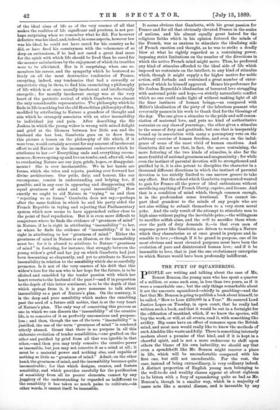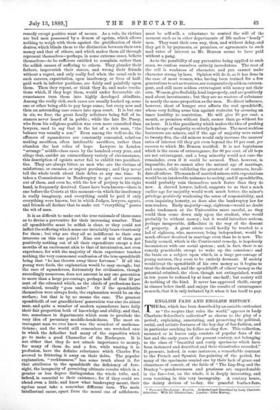THE F17RY OF SQUANDERING.
pEOPLE are writing and talking about the case of Mr. Ernest Benzon, the young man who has spent a quarter of a million, or some such sum, in less than two years, as if it were a remarkable one ; but the only things remarkable about it are the amounts squandered—chiefly in gambling—and the fact that Mr. Benson is going to publish a book about himself, to be called, "How to Lose 2250,000 in a Year." Reassured Lord Justice Lopes on Tuesday, in open court, that he really had written such a book, and that it would be out in a fortnight for the edification of mankind, which, if we know the species, will buy the work, or will, at all events, read it, with something like avidity. Big sums have an effect of romance upon the British mind, and most men would really like to know the methods of such Aladdin-like waste and folly. There is something intensely modern about a promise of that kind, and if it is kept in a cheerful spirit, and is not a mere endeavour to shift upon others the blame of his own imbecility, we should say that even a spendthrift like Mr. Benson might recover a place in life, which will be uncomfortable compared with his first one, but still not unendurable. For the rest, the case, instead of being extraordinary, is very ordinary indeed. A distinct proportion of English young men belonging to the well-to-do and wealthy classes appear at about eighteen to be bitten with a fury of squandering quite as bad as Mr. Benson's, though in a smaller way, which in a majority of cases acts like a mental disease, and is incurable by any remedy except positive want of means. As a rule, its victims are bad men possessed by a demon of egoism, which allows nothing to weigh with them against the gratification of their desires, which blinds them to the distinction between their own money and that of others, and which makes them all through represent themselves—perhaps, in some extreme cases, believe themselves—to be sufferers entitled to complain, rather than the selfish causes of suffering to others. They plunder their fathers, impoverish their sisters, and wrong their friends without a regret, and only really feel when the usual ends to such careers, expatriation, open insolvency, or lives of half- paid work in inferior positions, are fairly and painfully upon them. Then they repent, or think they do, and make resolu- tions which, if they kept them, would under favourable cir- cumstances turn them into highly developed skinflints. Among the really rich, such cases are usually hushed up, some one or other being able to pay large sums; but every now and then an astounding case comes into open court. It is but one in six, we fear, the great family solicitors being full of in- stances never heard of in public; while the late Dr. Pusey, who from his religious position was even more consulted than lawyers, used to say that in the lot of a rich man, "the balance was usually a son." Even among the well-to-do, the offences of squanderers are constantly concealed, relatives making sacrifices, often intolerable sacrifices, rather than abandon the last relics of hope. Lawyers in London " arrange " middle-class cases by the hundred every year, and allege that, amidst an extraordinary variety of circumstance, this description of egoists never fail to exhibit two peculiari- ties. They are always bitter, as men who are the victims of misfortune, or enemies, or unjust parsimony ; and they never tell the whole truth about their debts at any one time. It takes a Commissioner in Bankruptcy to get exact accounts out of them, and even he, with the law of perjury in his right hand, is frequently deceived. Cases have been known—there is one before the Courts at this moment—in which the insolvency is really imaginary, and everything could be paid if only everything were known, but in which Judges, lawyers, agents, and friends all declare that to make out " everything " passes the wit of man
It is as difficult to make out the true rationale of these cases as to devise a preventive for their increasing number. That all spendthrifts must be selfish is clear, or they could not inflict the suffering which some one invariably bears vicariously for them ; but why are they all so indifferent to their own interests on this one point? Nine out of ten of them get positively nothing out of all their expenditure except a few months of an excitement akin to that of intoxication, not even experience, for with the majority of them experience teaches nothing, the very commonest confession of the true spendthrift being that "he has thrown away three fortunes." If all the young were fools, the explanation would be easy enough; but the race of squanderers, fortunately for civilisation, though exceedingly numerous, does not amount in any one generation to more than a large per-centage, perhaps half of that 33 per cent. of the educated which, as the chiefs of professions have calculated, usually "goes under." Or if the spendthrifts themselves were always fools, the explanation would be on the surface; but that is by no means the case. The greatest spendthrift of our grandfathers' generation was also its ablest man, and quite a number of modern squanderers have fully their fair proportion both of knowledge and ability, and that, too, sometimes in departments which seem to preclude the very idea of pecuniary muddle-headedness. The most ex- travagant man we ever knew was the soundest of mathema- ticians ; and the world still remembers one wretched case in which the defaulter had many of the capacities which go to make a good Chancellor of the Exchequer. It is not either that they do not attach importance to money, for many of them do, and a few, while wasting it in profusion, have the definite reluctance which Charles Fox avowed to frittering it away on their debts. The popular explanation, "recklessness," has some truth about it, for that attributes to the spendthrift the deficiency of fore- sight, the incapacity of perceiving ultimate results which in a greater or less degree distinguishes the whole tribe, and, indeed, is essential to their existence ; for if they could see ahead even a little, and knew what bankruptcy meant, their egoism must take a somewhat different turn. The main intellectual cause, apart from the moral one of selfishness,
must be self-will, a reluctance to control the will of the moment such as in other departments of life makes "heady" men. They want their own way, then, and without delay, and they get it by payments, or promises, or agreements to such mad rates of interest as Mr. Benson seems to have paid without a pang.
As to the possibility of any preventive being applied to such cases, we confess ourselves entirely incredulous. The root of the evil is weakness of character, and you cannot make character strong by laws. Opinion will do it, as it has done in the case of most women, who, having been trained for a few generations to act as trustees, are comparatively seldom extrava- gant, and still more seldom extravagant with money not their own. Women give foolishly, lend improperly, and are positively mad about investments ; but they are no wasters of substance in nearly the same proportion as the men. No direct influence, however, short of hunger ever affects the real spendthrift, whose very failing arms him against restraint by arousing an inner hostility to restriction. He will give 10 per cent. a month, or promises without limit, sooner than go without for an hour. It is this peculiarity which makes the idea of pushing back the age of majority so utterly hopeless. The most reckless borrowers are minors, andlf the age of majority were raised to twenty-five, the old minors would only increase the inure's' rates of interest till they got even beyond the 18 per cent. per mensem to which Mr. Benson testified. It is not boyishness which is the cause of extravagance, for 60 per cent. of all boys are not extravagant, and a long minority would not cure the remainder, even if it could be secured. That, however, is impossible, for we cannot alter the natural age of marriage, and cannot, while validating the greatest of contracts, invali- date all others. Thousands of married minors with expectations would be an intolerable nuisance to society, and if spendthrifts, would probably ruin themselves much faster than they do now. A shrewd lawyer, indeed, suggests to us that a much earlier age for majority would work much better, the minor's privilege positively weakening the sense of responsibility, and even impairing honesty, as does also the bankruptcy law for non-traders. Early majority—say, eighteen—would no doubt make tradesmen at the Universities more careful, as they could then come down only upon the student, who would probably be without money; but it would introduce serious, perhaps insuperable, difficulties in the way of the descent of property. A great estate could hardly be trusted to a lad of eighteen, who, moreover, being independent, would be much oftener deceived in marriage even than he is now. The family council, which is the Continental remedy, is hopelessly inconsistent with our social system ; and, in fact, there is no remedy practicable except to wake up the conscience and the brain on a subject upon which, in a large per-centage of
young natures, they seem to be entirely dormant. If society would treat the spendthrift of his own money as it begins to treat the drunkard, and the spendthrift of others' money as the potential criminal, the class, though not extinguished, would in ten years be reduced by at least one-half; but society will do nothing of the kind. It never has approved thrift, except in classes below itself, and enjoys the results of extravagance so much, that it is only irritated by it when it has itself to pay.



































 Previous page
Previous page